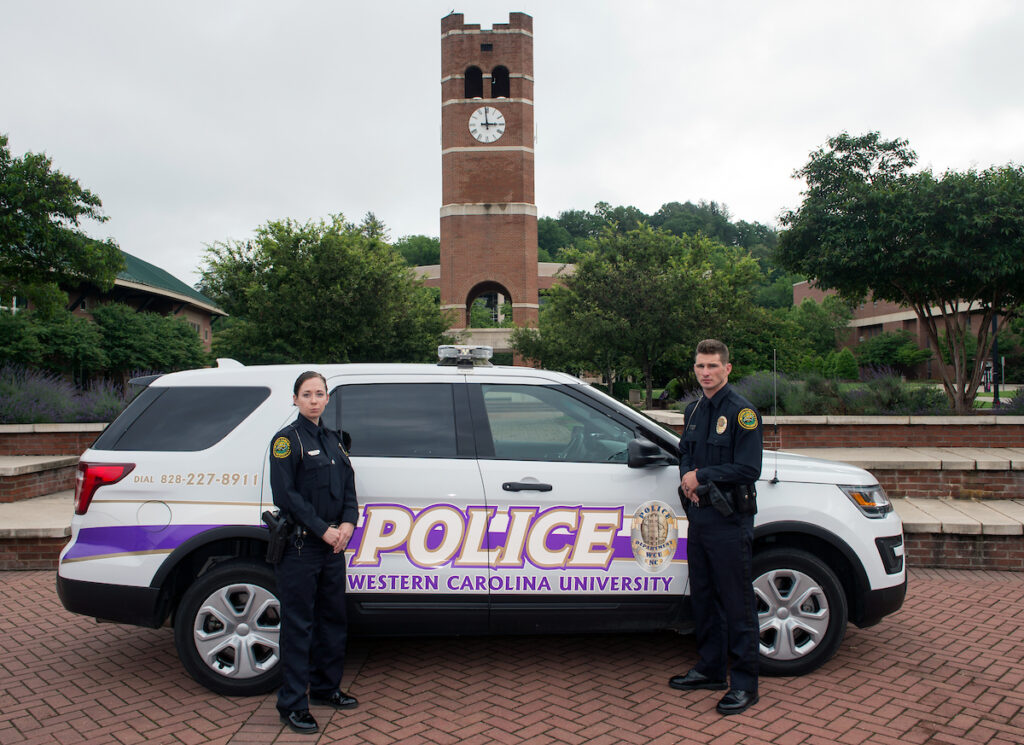Story co-written/produced with Jessica Stephens
Campus police push past their personal lives and stride to keep students’ safety their first priority on Western’s campus during the 2021-2022 school year.

Under the WCUPD’s website, it is stated that officers balance their personal and professional lives while keeping perspective and a sense of humor.
Our reporter Savanna Tenenoff, a senior at WCU, on Friday, Dec. 3 joined the night shift on a ride-along with the sergeant on staff Aaron Henson. Henson has been part of the WCU campus police for over 5 years. Among students, he is known as “hot cop.” Among his colleagues, he is known as “Hollywood.” Henson doesn’t have any issues with the names and finds them funny.
There were four vehicles on the Friday night shift with a total of four officers and one dispatcher on duty. They say that Friday nights are usually busy but this one was unusually slow and uneventful. Throughout the night there were two people pulled over for running a stop sign, multiple stuck elevator calls, a broken-down Cat Tran, and a “suspicious odor” call for marijuana in the Noble dorms. With low calls, checking all zones on Western’s campus and the property was the majority of the night. It is often that they will sit there and make sure students are safe walking and that there is no criminal activity.
Western Carolina has just above 30 officers on its police staff including one chief multiple lieutenants, sergeants, master officers, and officers. All officers undergo the same training as county law enforcement and are expected to continue their training during their role as campus police.
Each shift is approximately 12 hours, depending on calls and events. On-duty officers must keep constant communication for their own safety. Every change of location means a walkie-talkie call to let everyone on shift know. The change of location call keeps all officers on alert of the area incase a something like a shooting were to occur.
With crime rates recently on the rise on campus, larceny seems to be consistent through the years. Tenenoff learned that Noble and Allen Hall are hotspots for criminal activity on campus and crosswalks are some of the most dangerous. The heaviest traffic crosswalks are in front of Chili’s and the roundabout at the school entrance.
Parking and crosswalk patrol is not under the campus police and is a separate department.
The officers joined together multiple times throughout the night to update and check-in with each other. The first coffee break is at around 10 p.m. During this coffee and snack break at the Catamount Travel Center, the officers opened up about the stress on the job and how not many people realize that officers go through traumatic calls.
They shared that they are humans first and are sometimes faced with watching someone take their last breath. Being first on the scene can be a permanent image in an officer’s brain when seeing the bodies and how the person died.
Officer Henson said, “you never get used to it; you get numb.”
As officers, they are expected to rely on instinct and training to guide their reactions during the call. It is often missed what officers do after the call. A piece of advice they all shared was the importance of talking to fellow officers that have experience.
A way the officers take a breather when on duty is to watch TV. The TV stays on MTV, usually Ridiculousness, in the break room. It is a show that does not require attention. It also keeps the officers awake with laughter.
Although protocols and calls consist of the same information, each experience is different.
Michael Oroz, a fellow WCU alumni, and police officer said, “always expect the unexpected.” It is a common phrase but held truth in that any call can turn dangerous in a matter of one second. A simple traffic stop can turn into a murder or shoot-out. That is why they make sure to scan every square inch of the inside of the car when they pull someone over.
Police officers run in Orzo’s family blood. Growing up with his father being a police officer, he understood the dangers that come with the duty. Oroz is still new when it comes to police work and has only been with campus police for about a year. Oroz is leaving WCU in February to become a highway patrol officer.
During those times of heightened adrenaline, there is a time where young officers are unsure how to exactly react. When it comes to more severe calls that involve a possible fatality, no amount of training will prepare someone for the emotional impact it may have.
If the officers have time, they gather together at a location to debrief on how they are doing. They climbed out of their cars and circled together in the frigid December air. For this particular get-together, Tenenoff had the opportunity to sit with the officers and ask more emotional questions.
The night shift of Dec. 3 unanimously spoke on officer mental health and how outsiders do not know much about the trauma that officers experience. See some more on the campus police in the video bellow.
Henson said, “it’s like a switch. When you’re laughing with your coworkers and a serious call comes in, you can’t go to the call laughing.”
COVID-19 has impacted the campus police. According to their 2016-2017 and 2020-2021 annual report, they have received almost half the number of calls that they did in the 2016-2017 school year. The number of total arrests went down by 17. The dorm walking patrol total went down by over 1,000 .


